Punjab govt allocates Rs1.24tr for development
Infrastructure, education, health uplift prioritised
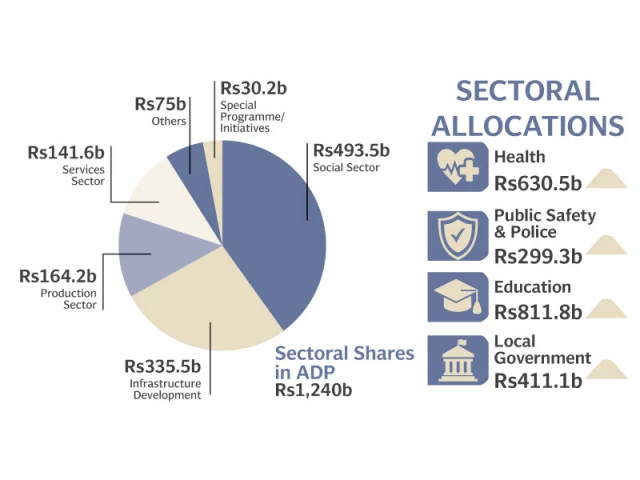
The Punjab government has announced a record Rs1.24 trillion Annual Development Programme (ADP) for the fiscal year 202526, aimed at accelerating economic growth, enhancing infrastructure and expanding access to critical public services across the province.
According to the budget documents, the development allocation includes Rs314.1 billion for capital expenditures, Rs801.5 billion for revenue-based projects and Rs124.3 billion in foreign project assistance. An additional Rs233.4 billion has been earmarked for special and other development initiatives. The plan seeks to balance ongoing projects with new schemes, aligned with Punjab's long-term development agenda.
Social sectors account for the largest share of the ADP, receiving Rs493.5 billion. This includes Rs100 billion for school education, Rs39.5 billion for higher education, Rs5 billion for special education, Rs4 billion for literacy and non-formal education, Rs7.6 billion for sports and youth affairs, Rs95 billion for specialised healthcare and medical education, and Rs86 billion for general health and population welfare.
Water supply and sanitation projects will receive Rs6 billion, social welfare Rs7 billion, women development Rs14 billion, and local government and community development Rs142 billion.
Infrastructure development has received Rs335.5 billion, with the road sector receiving Rs120 billion for improving connectivity, particularly between rural and urban areas.
The irrigation sector is allocated Rs38 billion, including Rs10.3 billion from foreign assistance, for modernising water management systems to enhance agricultural productivity and climate resilience.
The energy sector is set to receive Rs7.5 billion, while Rs25 billion will go toward public buildings. Urban development will receive Rs145 billion, including Rs24.2 billion in foreign aid.
A total of Rs164.2 billion is dedicated to production sectors such as agriculture, livestock, fisheries, forestry, and cooperatives. Agriculture has been allocated Rs80 billion, targeting mechanisation, improved irrigation, and better seed quality.
Livestock and dairy development is allotted Rs5 billion, and fisheries and forestry together will receive Rs15 billion. In addition, Rs10.5 billion has been earmarked for price control and commodity management, Rs10 billion for wildlife conservation, and Rs500 million for the cooperatives department.
In support of youth employment and innovation, Rs12 billion has been allocated for skill development and entrepreneurship initiatives. The industry and commerce sector has also received Rs12 billion, aimed at promoting small businesses, industrial park development, and attracting investment.
Tourism has been allocated Rs18 billion to support heritage preservation, hospitality infrastructure, and promotional activities. The mining and minerals sector will receive Rs12 billion.
Service sectors will benefit from Rs141.6 billion in funding. Governance and IT reforms are being prioritised with Rs35 billion allocated for digital transformation, e-governance, and improving service delivery. Labour and human resource development will receive Rs20.4 billion, while the transport sector is being given Rs85 billion, which will be used to introduces electric buses in various cities of the province.
Emergency services, including Rescue 1122, have been allocated Rs12 billion to strengthen disaster response and emergency medical services. Environmental protection and climate change initiatives are also being supported with Rs15 billion.
Special development initiatives are budgeted at Rs30.2 billion, while Rs38 billion has been set aside for planning and development operations. The plan includes dedicated funding for minority affairs, human rights, religious affairs, and cultural preservation, with the goal of fostering inclusive development.
Key new initiatives under the ADP include the Apni Chhat Apna Ghar housing project with an allocation of Rs50 billion, and the Chief Minister's Saaf Pani Programme with Rs15 billion total outlay and Rs5 billion allocation.
The government will strengthen new PHAs and WASAs across the province with Rs10 billion and launch the Chief Minister Punjab Development Programme worth Rs25 billion.
Other local development projects include the Model Village Programme, the Rs96 billion Punjab Rural Sustainable Water Supply and Sanitation Project, and the Murree Development Programme Phase-2.
In the transport sector, Rs89 billion has been allocated for introducing over 600 eco-friendly buses across major cities, with Rs45.9 billion in this fiscal year. High-speed rail and tourist train feasibility studies have received seed money, as have urban mass transit systems in Lahore, Faisalabad, and Gujranwala.
Other initiatives include planning for regional railways, a proposed Air Punjab airline, and infrastructure development for electric buses in Lahore under the Punjab Clean Air Programme.

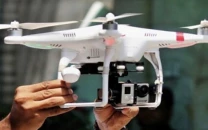

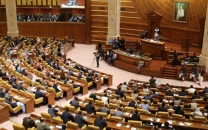


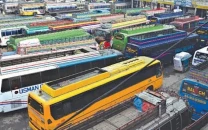


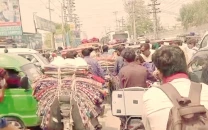












COMMENTS
Comments are moderated and generally will be posted if they are on-topic and not abusive.
For more information, please see our Comments FAQ